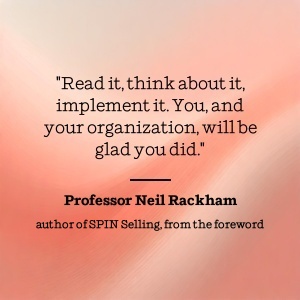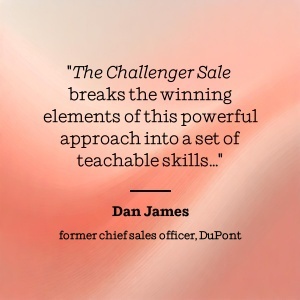Customer Services
Copyright © 2025 Desertcart Holdings Limited
Desert Online General Trading LLC
Dubai, United Arab Emirates


Full description not available



J**M
Strong research and important sales insights
This book comes very highly touted, especially by Neil Rackham himself, who calls it "the most important advance in selling for many years."I personally don't think it reaches quite that level, but overall it is an excellent book, with provocative insights and useful information for salespeople looking for ways to break out of the pack.The key to a really good book is that it makes you say, "I never thought of that before," and to use that insight to improve your life in some way. Interestingly, that's also the key to a really good salesperson, as well.The book is based on extensive research by the Sales Executive Council into the attributes of successful sales professionals. They found that salespeople tend to cluster into five different types, based on their behaviors: Hard Workers, Challengers, Relationship Builders, Lone Wolves, and Reactive Problem Solvers. Research is great when it generates new and unexpected insights, and three are central to the book.Key insight #1: Salespeople matter--a lot!One of the surprising insights generated by their research was that the Sales Experience accounted for 53% of the contribution to customer loyalty, more than company and brand impact, product and service delivery, and value-to-price ratio combined! In other words, the latter three are just tickets to be able to play; how you sell is more important than what you sell. In complex solution sales, star performers outperform core performers by 200%, as opposed to 59% in transactional selling, so it's a critical insight.If how you sell is so important, the next critical insight is about what the most effective reps out of the 6,000 that they surveyed do differently.Key insight #2: They don't care how much you care until they know how much you knowOf the five types, relationship builders are the least effective performers. The old saying, "They don't care how much you know until they know how much you care," is better said, "they don't care how much you care until they know how much you know." Relationships are important, but they are the result of successful selling and not the cause (as Rackham says in the Foreword).In other words, what customers value most today is a rep who teaches them something, who challenges their insights and their view of the world. These reps are the Challengers and they comprise the largest component of top performers. Unlike relationship builders who focus on resolving tension and keeping everyone happy, challengers like to produce constructive tension, because major sales are about creating change and change generally requires discomfort.The key is not in discovering the customer's needs and being able to express them, it's in being able to create the need that they didn't even have by getting them to look at their world in a way they had not before. As they say, if your customer's reaction to your pitch is, "That's exactly what's keeping me up at night. You really understand our needs", you've actually failed. What you want them to say is, "Huh, I never thought of it that way before."Of course, if you do this and then they go ahead and solve their problem with a cheaper competitor, all you've done is sold for someone else. So, the other critical piece is to answer the most important question: "Why should our customers buy from us over all competitors?" This question is surprisingly difficult for reps to answer, as I personally have observed in my own training classes. But, with enough thinking and refining, you can answer the question. The thought process then becomes:* What are our strengths?* How do those strengths give the customer the capability to solve a problem or take advantage of an opportunity they don't know they have?* What do we need to teach the customer so they will value that capability?As the book says, "The sweet spot of customer loyalty is outperforming your competitors on those things you've taught your customers are important."In order to achieve this sweet spot, Challengers do three things very well: teach, tailor, and take control. The middle section of the book explains how to build the teaching conversation, tailor your strengths to individual stakeholders, and take control of the sale. The teaching phase is the most expensive part of the book and appropriately enough, by far the most insightful and most innovative. Just this part of the book would make it worthwhile.Key insight #3: Focus on the core 60%The final two chapters focus on how to implement the approach in the sales organization. Here their most important insight is that the focus should be on equipping the 60% of the sales force who are core performers to be able to follow the Challenger Selling model. The top 20% won't need it, and the bottom 20% won't get it.The only quibble I have with The Challenger Sale is that many ideas which are relatively well-known already are treated as if they are startling new discoveries. I read some of the passages with the same irritation that Native Americans must feel when told Columbus "discovered" America. For example, they introduce the idea of tailoring your insight to the specific individual needs of the different stakeholders, which all good sales methodologies have incorporated for years. (In fairness, though, so many of these ideas that are common knowledge are still not common practice.)I would strongly recommend this book to sales executives, sales managers, and most of all, to sales professionals; I challenge you to read it and apply it.
M**N
RIP Relationship Selling - Enter The Challenger Sale
The Challenger Sale (TCS) is an important book for sales professionals and sales managers involved in complex B2B sales as it proves that a number of commonly held beliefs about sales behavior are obsolete.Unlike many other "how-to-sell" books based on theories and ideas on improvingsales performance, TCS is underpinned by rich and extensive data from more than 20,000 member sales professionals from more than 100 member companies, gathered over the past four years.You are a Prospect for Challenger Sales TrainingI don't have a problem that TCS is produced by the Corporate Executive Board (CEB) and that the CEB is a member organization providing for profit sales training for its members. They want to sell you Challenger Sales Development Services...in the same way every other author of sales performance literature wants to sell their services. It happens that we are very much aligned in our view of the sea-change that has occured in buyer behavior and the need for new approaches in engaging buyers.If you are selling complex software, enterprise hardware or services in a B2B environment and haven't read The Challenger Sale yet, then perhaps this article might convince you it's worth reading at least once...regardless of where you get your sales development services.Relationship Selling is DeadI and many of my peers were brought up in a World where, as a territory rep, our goal was to establish a relationship with the buyer, and over time, gain access to the organization to earn the opportunity to position our products/solutions.Through factor analysis of the data, TCS identifies the five distinct profiles or behavioral tendencies of sales people of which the relationship sales person has been the least successful in the past four years for both transactional and complex sales.Take-away:Today, when buyers have an abundance of information about vendors products and solutions at their fingertips, any salesperson that brings insight to the table that can create new opportunities for the buying organization can have a relationship based on that value. Buyers simply have no time or need of relationships with salespeople who do not create value.Challengers are Winners, Rain or ShineBased on an analysis of the data, in transactional selling, the star performers outperform the core by 59%. Hard Workers are the top producers in transactional selling.In complex B2B selling environments, the research indicates that star performers outperformed core performers by almost 200%. As the sale becomes more complex, the gap between the core and star performers widens dramatically...companies are becoming more dependent on fewer sales people to carry the day. It happens that Challengers were the only cohort to make their numbers in the downturn and today are the top performing behavior type by a wide margin.The 5 Sales ProfilesThe ChallengerLone WolfHard WorkerReactive Problem SolverRelationship BuilderChallenger Behaviour AttributesFrom the 44 attributes in the survey, six of them were statistically significant in defining the Challenger rep:Offers the customer unique perspectiveStrong 2 way communication skillsKnows customer value driversCan identify economic drivers of customers businessIs comfortable discussing moneyCan pressure the customerThe exciting news is that with the right training, coaching and sales tools, even relationship builders can learn to take control of the customer conversation like a challenger.Challenger Selling is JourneyThe Challenger model is developed around the following pillars:Teaching for DifferentiationTailoring for Resonance,Taking ControlThe authors point out that the Challenger Selling Model is simple in theory, but complex in practice and the book lays out the best-practices, tools and lessons learned in implementing the Challenger Selling Model. I recommend it highly.Bon Voyage!ResourcesJoin The Challenger Sale Group on LinkedInVisit the Challenger Sales WebsiteView an excellent recent interview with the authors by Anthony Iannario (you may need to join the TCS group to view it)To read the full review with graphics and links, visit[...]The Challenger Sale: Taking Control of the Customer Conversation
D**S
Must read for anybody in sales
The idea of a "challenger" has stuck with me since I read it. It's not something you will live by, but it's a very useful concept to have handy when navigating conversations & customer relationships. Teach, tailor, control.
R**S
Transformative Sales Strategies That Deliver Results
The Challenger Sale" has revolutionized my approach to sales. The authors present compelling research-backed insights into how top-performing sales reps, known as Challengers, excel by teaching, tailoring, and taking control of customer conversations. Implementing these strategies has not only boosted my confidence but also significantly improved my sales outcomes. This book is a game-changer for anyone in sales looking to enhance their effectiveness and drive better results.
Trustpilot
3 weeks ago
2 months ago